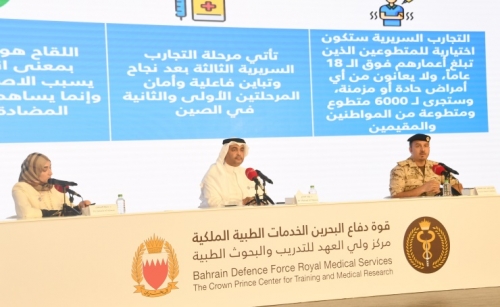Diligence call in re-opening
TDT | Manama
The National Taskforce for Combatting the Coronavirus (COVID-19) warned yesterday that a failure to comply with precautionary measures will accelerate the spread of the virus and therefore require a roll-back in Bahrain’s ongoing phased re-opening.
This was said by Ministry of Health undersecretary Dr Waleed Khalifa Al Manea during the national taskforce’s Press conference held at the Crown Prince Centre for Training and Medical Research at the Bahrain Defence Force (BDF) Hospital, where they highlighted measures taken to mitigate COVID-19.
Dr Al Manea was joined by fellow-national taskforce members BDF Infectious Disease Consultant and Microbiologist Lt. Col. Dr Manaf Al Qahtani and Salmaniya Medical Complex Infectious and Internal Diseases consultant Dr Jameela Al Salman. Dr Al Manea said that the national taskforce is closely monitoring all COVID-19 cases with the re-opening of certain sectors.
He added that they are paying particular attention to the percentage of positive cases, total active cases, hospital occupancy rate, and the number of cases requiring medical care as they continually assess the situation in the Kingdom amidst the gradual lifting of a number of restrictions.
Dr Al Manea said that regional and international research collaboration and information exchange helps to bolster the progress in COVID-19 treatment. In this regard, he noted that the Health Ministry has announced the initiation of a phase three clinical trial for a COVID-19 inactivated vaccine, in collaboration with UAE-based artificial intelligence company G42 Healthcare.
With regards to patient outcome, Dr Al Manea explained that the recovery rate is currently at 92.6 per cent in Bahrain with a 0.4 per cent death rate. Isolation centre capacity also stood at 21 per cent, with 1,752 out of 8,357 beds occupied, and 1,383 asymptotic cases being under optional home self-isolation after meeting the set criteria.
Speaking on the vaccine trials, Dr Al Qahtani emphasised that the inactivated vaccine does not cause infection, but triggers an immune response producing antibodies to fight the virus. The effectiveness of the produced antibodies will then be assessed as a measure of the success of the vaccine.
Dr Al Qahtani added that the clinical trials follow the successful completion of the first two phases in China, which have reported good success rates. The first trial proved the effectiveness of the vaccine while the second tested the immunogenicity of the vaccine on a limited number of volunteers.
Dr Al Qahtani revealed that the trial will enlist up to 6,000 volunteers who have not previously contracted COVID-19, are over the age of 18, and are willing to undergo a health assessment, in accordance with the set health requirements.
He also reassured all interested volunteers that everything has been done and all steps have been followed—at the highest levels— to make sure that the trials are as safe as can be to volunteers. On her part, Dr Al Salman noted that Bahrain has safeguarded freedom of movement for citizens and resident while restricting gatherings to minimise the spread of the virus—a process that has set precedents for the re-opening of selected sectors at each stage of the phased plan, whilst avoiding roll-backs.
Dr Al Salman added that the Health Ministry is continuously expanding COVID-19 testing capacity to identify, isolate, and break chains of infection; and random community-based testing sites have helped identify asymptomatic cases.
She went on to recognise the importance of continuing to adhere to preventative measures to reduce the spread of COVID-19 and allow for the next phases of reopening, as emphasised by the World Health Organisation’s recent conference and call to “do it all” when complying with preventative measures. Dr Al Salman underlined that these preventative measures have now been adopted by the majority of the community since the discovery of the first case in Bahrain five months ago.
Related Posts

